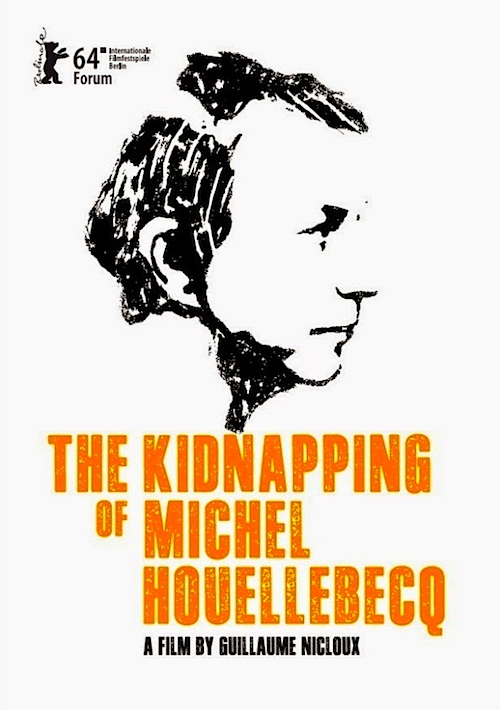By Joe Bendel. He is the French contemporary equivalent of the kid from “The Ransom of Red Chief.” He smokes like a chimney, drinks like a fish, and is a massive hypochondriac. Frankly, even Michel Houellebecq cannot imagine who would pay to get him back, but that seems to be the only detail his abductors have nailed down in Guillaume Nicloux’s The Kidnapping of Michel Houellebecq, which screens during the 2014 Tribeca Film Festival.
Although Houellebecq translations have been published in America, he has never really caught on in New York literary circles. Charges that his novel Plateforme was anti-Islam probably did not help (these were real legal charges, on which Houellebecq was ultimately acquitted). It also spurred wild rumors that Houellebecq had been abducted by Al-Qaeda when he abruptly disappeared during a book tour. That did not happen. Neither did the narrative written by Nicloux.
 When we first meet Houellebecq playing himself as he goes about his daily business, he strikes us as a massively self-absorbed bundle of tics. This impression only grows stronger when he is kidnapped by a trio of cut-rate gangsters. At first he resents the intrusion into his life, but he soon seems to appreciate having his captors at his beck and call. Luc is nominally in charge, but he clearly answers to people above him. He has stashed Houellebecq at his parents’ home, where he is watched over by Maxime the bodybuilder (played by French bodybuilder Maxime Lefrançois) and MMA fighter Mathieu (played by Mathieu “the Warrior” Nicourt).
When we first meet Houellebecq playing himself as he goes about his daily business, he strikes us as a massively self-absorbed bundle of tics. This impression only grows stronger when he is kidnapped by a trio of cut-rate gangsters. At first he resents the intrusion into his life, but he soon seems to appreciate having his captors at his beck and call. Luc is nominally in charge, but he clearly answers to people above him. He has stashed Houellebecq at his parents’ home, where he is watched over by Maxime the bodybuilder (played by French bodybuilder Maxime Lefrançois) and MMA fighter Mathieu (played by Mathieu “the Warrior” Nicourt).
Much to Luc’s frustration, Houellebecq largely wins over his parents and associates, despite his frequent demands for cigarettes and his favorite Spanish wine. Perhaps their greatest bone of contention is Luc’s refusal to let the writer keep his cigarette lighter. It seems like a small point in the larger scheme of things and an understandable position for a kidnapper to take, but it becomes symbolic of Houellebecq’s efforts to reassert his control.
Although more scripted than mumblecore, there is enough improv room for Houellebecq to put his stamp on the film. Nobody can accuse him of being overly concerned with his public image. It might be a great comedic performance, but it certainly feels like it has the ring of truth. He also develops some truly bizarre but effective screen chemistry with Nicourt, Lefrançois, and Luc Schwarz.
Kidnapping deftly skewers notions of the public intellectual and sends-up Houellebecq’s iconoclastic image, but the humor is of a decidedly dry variety. Houellebecq’s future biographers will surely have a field day with it, but it requires a post-modern sensibility to appreciate its docu-fictional games. Recommended for highly literate Francophiles, The Kidnapping of Michel Houellebecq screens this Friday (4/18), Saturday (4/19), Wednesday (4/21), and next Friday (4/25) during this year’s Tribeca Film Festival.
LFM GRADE: B
Posted on April 17th, 2014 at 10:51pm.